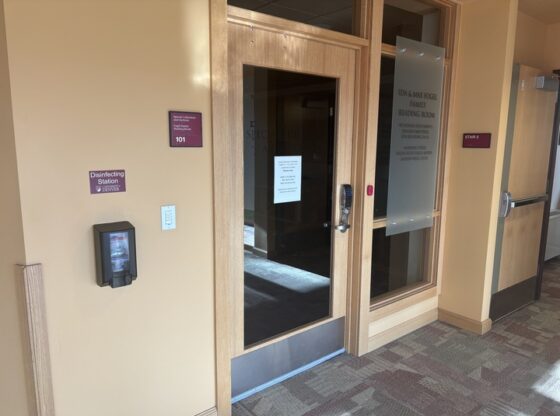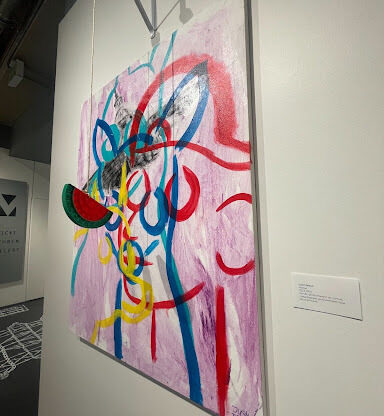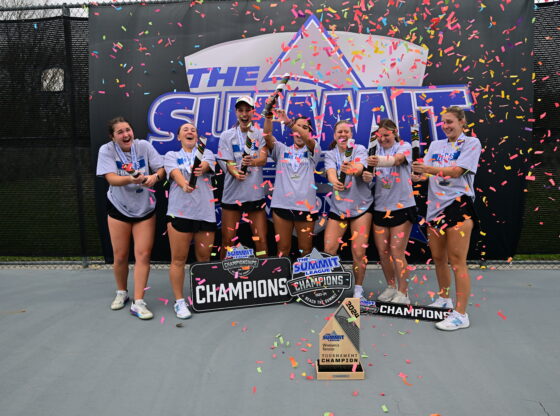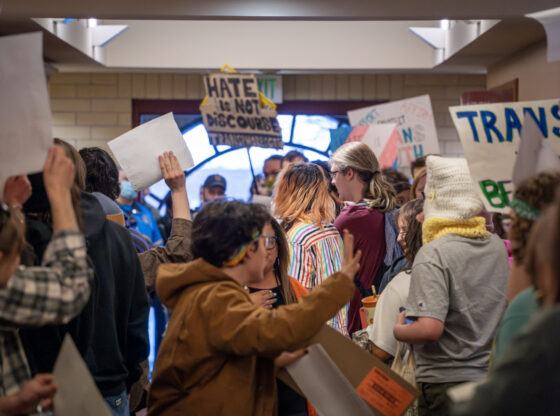When students pass by the front desk at Johnson-McFarlane Hall (J-Mac) and see Ryan Wadleigh working in front of his computer, they probably don’t imagine him performing in front of large adoring crowds around Denver dressed in drag. In fact, they might not even believe it when they hear that Wadleigh—known as Banana Splits or simply as “Banana” by her fans—made it to the final four competitors in the Denver Drag Olympics this year at Tracks nightclub.
Although Banana didn’t win Drag Olympics (this year, anyways), she put up a good fight, and many of her supporters would even argue that she deserved the crown. At Tracks nightclub’s final competition, many fans could be heard screaming “Banana!” from the crowd.
Wadleigh started his work as the Resident Director of J-Mac this Fall, after moving to Denver less than a year ago. Although Wadleigh doesn’t take classes, he lives in J-Mac and feels connected to the students and RAs in the building. “I’m not taking classes, but I still very much feel like I’m still in my student era,” he said.
Wadleigh is originally from New Hampshire where he studied at the University of New Hampshire with majors in communications and sociology and a minor in queer studies. Immediately after graduating in 2020, Wadleigh started his master’s degree in student affairs administration at Michigan State University, which brought him to the full-time position at DU he now holds.
For Wadleigh, Denver’s drag scene made the city an obvious choice. “When I was applying for schools, I only applied in cities that had a drag scene,” he said. “I loved the people that I met in the interview [at DU], but I would say probably 70% of the decision was the things that I could do outside of the job, which is drag,” said Wadleigh.
Wadleigh is a big fan of RuPaul’s Drag Race, a reality TV show where talented drag queens from across the country compete for a cash prize and the crowning title of “America’s Next Drag Superstar.” Two drag queens from Denver have won this crown, the first being Yvie Oddly who won season 11 in 2019, and her “drag daughter” Willow Pill, who won season 14 in 2022, right around when Ryan was looking for a job.
“I remember seeing [Yvie and Willow] talk about the Denver drag scene and how it was more of a creative and quirky, unique energy, so Denver ended up being like the landing point,” explained Wadleigh.
When Wadleigh first arrived in Denver in June of 2022, he began his journey of performance in bars and queer spaces, something he hadn’t had access to back in New Hampshire and Michigan. Since his first performance at the gay bar Charlie’s in downtown Denver, Wadleigh has brought his talents to many other venues and has established his place within the Denver drag community.
“Really, though, my introduction into the community was Hamburger Mary’s, which is a drag-themed restaurant here in Denver and a chain across the U.S.,” said Wadleigh. At Hamburger Mary’s, Wadleigh modestly revealed, Banana won the August drag competition for up-and-coming queens in the area, So You Think You Can Drag. Banana was invited to return the following month as a judge and returned again in October for an all-stars competition, which she half-jokingly affirms was “robbed” from her.
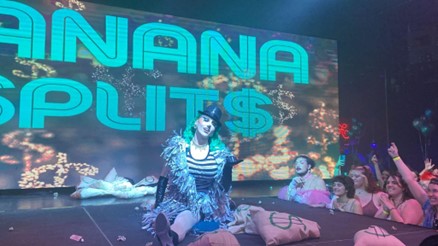
While Wadleigh has loved entering the drag scene in Denver, he admits it’s not quite what he was anticipating. “I’m definitely not the energy that everybody appreciates, which is weird because I thought Denver would be a little weirder in terms of drag, but sometimes they just love the classic drag queen,” said Wadleigh.
So what makes Banana so different from the “classic drag queen?” For starters, she has not worn a real wig in a year, instead manipulating thrifted plastic tablecloths into hair. In addition, unlike more traditional costumes resembling real people, Splits takes inspiration from objects, themes or characters.
“Some of my favorite numbers have been when I dressed up like an alien or a cow—or [one week] I was cupid, so I had a bow and arrow and a diaper on … Those are the ideas that inspire me the most, and once I have that idea, I start to think, ‘How would that look if it was a drag queen?’” said Wadleigh.
Banana’s tradition of turning trash into treasure didn’t just start with the making of wigs out of tablecloths. Ryan revealed that “In high school, [me and my friends] were the lamest people ever. On Saturday night, we would go into our basement and record our own episode of RuPaul’s Drag Race, where we would do an unconventional materials challenge. We would get our recycling bin and bring it to the basement and say ‘you have to make an outfit out of this.’”
If Banana Splits had to be described in terms of one pop number, it would be ‘Happy’ by Pharrell Williams. “When I perform in drag, I try to just be filled with joy. I’m not somebody who does a lot of dramatic or elegant performances,” explained Wadleigh. So of course, her drag name had to go hand in hand with this sentiment and thus emerged the name. Wadleigh admits that “[The name] kind of fell into place more than it came from a really intimately formed great idea, but I think it’s slowly started to turn into a better idea.”
But not everything in drag is glamorous and happy, drag queens are inherently politicized and their rights have been under question recently all across the United States. Tennessee was the first state to pass a bill banning public drag shows, and at least 14 more have introduced other anti-drag bills.
“There’s something so powerful about being visible, and about being unafraid to be yourself… The political aspect of drag is so inherent in the fact that we just show up. The fact that you see me like that is political, the fact that I put it at the bottom of my resume, that’s political. I’m advocating for queer rights just by being there,” said Wadleigh.
On the other hand, Wadleigh critiques drag queens who aren’t using their platform to advocate against the drag bans. “We didn’t get a message from RuPaul about the drag bans for weeks. People who have really large platforms, I think, have a responsibility to speak out on some of those things.”
Queer people are nine times more likely to be victims of hate crimes than non-queer people, and one in two transgender people are sexually abused or assaulted in their lives. Wadleigh feels that drag queens aren’t political because they want to be, but rather because they don’t have a choice. “A lot of the activism came as a result of trauma and with that’s what’s happening now with the drag bans, I think we are activating not because we’re so excited to be political, but because we are political out of necessity,” he explained.
Drag is a powerful and meaningful art form that can significantly affect queer lives. Wadleigh reflects fondly on the times when fans have told him how much of an impact his performances have had on their lives. “A drag performance might feel so insignificant to me, I might not realize the impact that has on [someone] until weeks, months, years later, when they tell me how much it meant to them. And then it kind of hits you.”
Wadleigh has big dreams for Banana’s future in the drag scene, including starting her own show with her name on it or even auditioning for RuPaul’s Drag Race one day. But he admits “that seems a million light years ahead of me.” For now, Wadleigh is focusing on building up Banana’s drag family and connecting with younger people who are interested in drag.
Stay tuned on what Banana is up to and where she’s performing on Instagram, TikTok and Twitter, or support her directly via Venmo or Cashapp, all of which she appears as @itsbananasplits.
Disclaimer: The personal opinions and statements in this article reflect Ryan Wadleigh/Banana Split’s individual views and are not on behalf of Housing and Residential Education (HRE) at DU.





